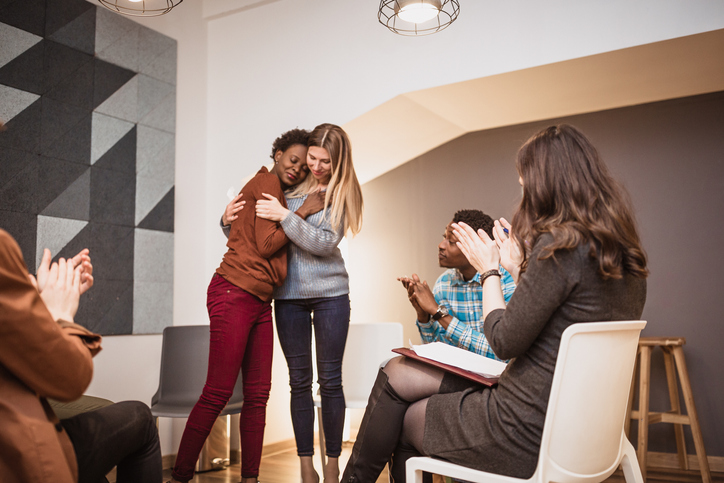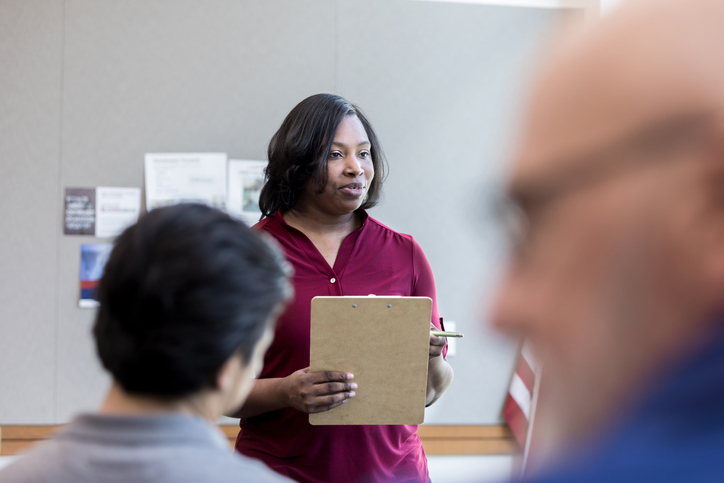Why Love And Sex Addicts Anonymous Meetings Work
Share the post
Share this link via
Or copy link

Source: NoSystem images / Getty
Being a love and sex addict can destroy your life, at worst, and at the best, leave you with a life that isn’t entirely yours—your addiction will always be the ruler. All of your decisions will be dictated by that addiction. And, just like with any sort of addiction—whether it’s to a substance, to gambling, to spending, or anything—it can make you abuse friends, break trust, drop the ball on major responsibilities, and generally be a not-so-upstanding citizen. That’s why the steps to getting over relationship addiction are quite similar to the 12 steps in an alcoholics anonymous program.
I recently reconnected with a friend who had been a love and sex addict for many years, and that addiction had made her a bad friend. I did pity her, because I could see that, no matter how much she upset me, she was ten times more miserable internally. Love and sex addiction can leave one feeling crazed and unhinged. And as much as I wanted to be there for her, I had to be there for myself, more. I just couldn’t put up with her completely bailing on our plans and going MIA because she met a guy who she shacked up with for a week one more time. I couldn’t handle her leaving me at a bar to go home with a stranger—not so much as a text letting me know she’d left—one more time. And I really couldn’t handle meeting one new boyfriend of hers, investing in him and liking him, only to have him replaced within two weeks. But that’s the life of a love and sex addict.
When she implored me to give our friendship a second chance, I was surprised. She had changed. But how? “Love and sex addicts anonymous.” The meetings really work for her. Here’s a look into why that is.

Source: SDI Productions / Getty
She sees it really is a sickness
Love MadameNoire? Get more! Join the MadameNoire Newsletter
We care about your data. See our privacy policy.
Before, she thought that her feelings—her impulses and general behavior—were unique to her. She thought that this was all some confusing, messy, blurry ball of behaviors that nobody else dealt with. But at the meetings, she hears people share, and their thoughts and feelings are shockingly similar to hers. So she recognized she has a group of symptoms and that this is, in fact, an illness.

Source: SDI Productions / Getty
And admitting is the first step
Like with any addiction, admitting you have a problem is the first step to recovery. From the day she showed up at those meetings, she was admitting that she had a problem. She was accepting the idea that something needs to change into her psyche. She was adding a level of taboo—some big yellow caution tape—around her preexisting behaviors that wasn’t there before.

Source: Klaus Vedfelt / Getty
The stories are horrifying
The stories she has heard have been pretty graphic and frightening. I won’t go into them here, but she says it’s good for her to hear the rock bottoms of others. It really helps solidify for her that this is an illness that interferes with one’s judgment and almost possesses them, taking over their regular personality.

Source: Westend61 / Getty
She doesn’t want to get to that point
The last thing she wants is for her life to become as bad as some of the others in the group. Though it’s harsh to say, she gets some comfort in thinking, “Well, I haven’t done that” and she wants to stay in the group to make sure she doesn’t get to the point that others have reached.

Source: SDI Productions / Getty
Yes, sharing can be embarrassing
My friend admits that sharing what she’s done has been a bit embarrassing. But it’s been important, because she had blocked a lot of it out. It’s been good for her to relive it all, and tell the stories, and see the looks on other’s faces when she does. It’s been difficult—of course—but good for her.

Source: vitapix / Getty
So, you do less embarrassing stuff
Knowing these meetings—and the sharing—are coming up keeps her accountable for her own behavior. She knows that, if she does something really bad, she’ll have to share it at the meeting. So, she doesn’t want go have embarrassing stories to bring to the meetings. She knows, “If I do this, I have to face the music when I tell the group.”

Source: Hirurg / Getty
She admits to new men she has a problem
She has to admit to new men that she has a problem. It’s one of the rules. She has admitted to me that sometimes, she tries not to tell them. But it weighs on her, like a big, dirty secret—the fact that she does have an addiction—and it’s hard to keep it quiet for long. But it’s good that she feels compelled to tell men, because it keeps them at a distance. The group encourages her to be honest with new men about this issue.

Source: PeopleImages / Getty
She’s not allowed to date right now
So long as she is attending meetings, she isn’t allowed to date. That’s the rule. She can obviously break it and it’s not like she’ll be kicked out of the meetings. But, again, the meetings hold her accountable. If she starts up a new relationship, she knows she’ll need to tell the group (or deal with the massive guilt that comes with not telling them) and that weighs on her.

Source: AJ_Watt / Getty
If she’s there, she’s not…somewhere else
If nothing else, when she’s in meetings, she isn’t at a bar meeting men, shacking up with some dude she just met, running off for the weekend with a guy, or hiding away with a new “love” (whom she’ll be done with in a week). It is a designated time when she is not participating in destructive behavior.

Source: Morsa Images / Getty
She has a sponsor
Just like when someone is in alcoholics anonymous, my friend has a sponsor. When she feels the urge to have a one-night stand, call an ex over, call that friend with benefits, or do something she knows she shouldn’t, she calls her sponsor. She gets to transfer some of that codependency from destructive relationships, to a productive one with her sponsor.

Source: alvarez / Getty
It helps with the loneliness
All of it—her sponsor, the meetings, and the friends she makes in the meetings—helps with the loneliness. And loneliness is often the main reason people become sex and love addicts. But this is a healthy way to fill the loneliness, because these individuals know she has a problem, and don’t enable her.

Source: LeoPatrizi / Getty
She is finding new outlets
Part of being a love and sex addict is sexualizing difficult feelings. So stress, sadness, disappointment, anger…all of these things can turn into arousal. Everyone in the world experiences those feelings! Everyone needs an outlet for them. In meetings, my friend learns healthy ways to deal with those feelings, since they won’t just go away.

Source: chabybucko / Getty
And learning to create boundaries
A big part of these meetings is learning to create boundaries, which is something sex and love addicts struggle with. So, example: don’t go on a weekend trip with a man you’ve been on two dates with. Don’t introduce this first date to your mom and dad tonight. Don’t have sex before getting to know someone. Some seem obvious, but sometimes, creating boundaries is more nuanced, and it’s important to have a place to talk about situations that come up, and how to maintain boundaries in those.

Source: ljubaphoto / Getty
She’s identifying the why
There’s always a reason as to why someone becomes a love and sex addict. There is usually a cause. This person could have turned to anything as her addictive, destructive outlet—like drugs or alcohol—but she turned to sex. Through these discussions in the meetings, she’s coming to understand what events in her life made her have this unhealthy relationship with love and sex.

Source: martin-dm / Getty
The very act of going empowers her
Love and sex addiction can leave a person feeling weak. But the very act of going to meetings makes my friend feel empowered. Just the act of getting in the car and showing up reminds her that she has control over her actions. Even if she doesn’t share one week, so long as she puts her butt in that chair, she made a healthy choice for herself that she followed through with. That shows her she can make more healthy choices.
-

Meet Dominique Fils-Aimé, The Haitian-Canadian Star Redefining Jazz For A New Generation: ‘This is My Vision' [Exclusive]
-

Cooking With Purpose — How Brittney Williams Honors Her Caribbean Roots Through Food
-

9 Famous Lesbian Women Who Were Married To Men
-

Purpose Behind The Lens: How Nate Edwards Films The Extraordinary Inside The Everyday








